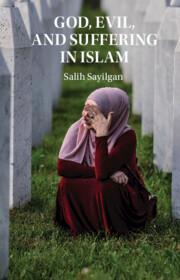Acknowledgments
There are many people who helped me on the journey of writing this book. I am thankful to Kim Harnes and Megan Grande, who read the first draft of the manuscript. Their suggestions improved the text considerably and saved me from many errors. I am warmly indebted to Alparslan Acikgenç, Osamah Saleh, Said Özervarlı, and Mustafa Uluçay, who guided me to the right resources in the field and revised some of the translations from Turkish and Arabic.
The problem of evil and suffering has often been part of the conversations with my colleagues in the Department of Theology and Religious Studies at Georgetown University. The exchanges have deepened my understanding of the matter. I am especially grateful to Paul Heck, Annalisa Butticci, Matthew Anderson, Frederick Ruf, Min-Ah Cho, Peter Phan, Lauve H. Steenhuisen, Kerry Danner, Leo Lefebure, and Lisa Zaina. I am also thankful to Ariel Glucklich, Julia Lamm, Alan C. Mitchell, Erin Cline, Stephen M. Wilson, Jonathan Ray, and William Werpehowski for their collegiality and support.
My students at Georgetown University read the draft of some of the chapters of this book. Their questions and comments shaped this study. I have also been teaching for Georgetown’s Prison and Justice Initiative. As part of this program, I have taught one of my courses at a prison facility in Maryland. My inmate students also read a few chapters. The perspectives of the incarcerated community on the topic enriched my thinking immensely. Many aspects of this work would be incomplete without the contribution of my students. I am thankful to all of them.
I have been attending a family Qur’an study group for a number of years now. The problem of evil and suffering has been a recurring theme of our discussions. The gathering is intergenerational and includes participants from all walks of life. To the Waheed, Shikoh, Munir, Siddiqui, Awan, Puthawala, and Sheikh families, I am grateful for your insights from the Qur’an.
I owe a special thanks to Beatrice Rehl and her team at Cambridge University Press. Beatrice supported this project from the beginning and always addressed my questions and concerns with patience and generosity. I am also indebted to the two anonymous readers for their thoughtful and constructive reviews.
My heartfelt gratitude goes to my family for their love and care while I was working on this project. My wife, Zeyneb, also a scholar in Islamic studies, remains a helpful critic of my work and I treasure our many daily conversations on the question of evil and suffering.

